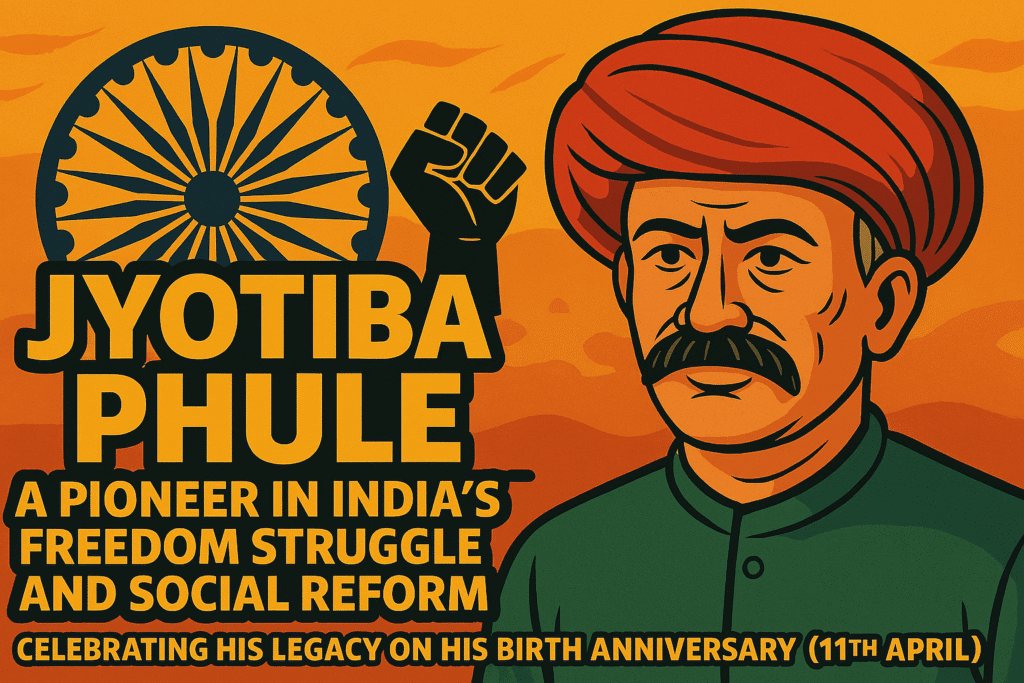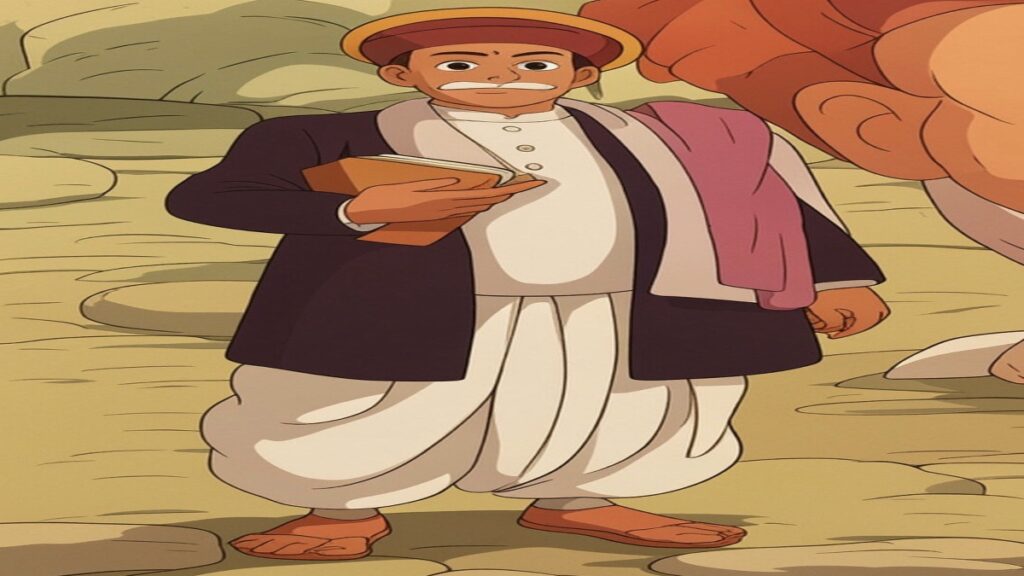
The Visionary Leader Who Shaped Modern India
Born on 11th April 1827 , Jyotirao Govindrao Phule, popularly known as Jyotiba Phule, was one of the most influential figures in India’s socio-political history. While his name is often associated with social reform movements, his contributions to India’s struggle for freedom are equally significant. As we celebrate his birth anniversary today, it is imperative to delve into his multifaceted legacy—his fight against caste-based discrimination, advocacy for women’s rights, and efforts toward education and empowerment, all of which laid the foundation for a free and equitable India.
For students preparing for competitive exams like UPSC, PCS, and others, understanding Jyotiba Phule’s role in India’s freedom movement is crucial. This article explores his life, philosophy, and contributions while highlighting their relevance in contemporary times.
Early Life and Education: Overcoming Adversity

Jyotiba Phule was born into a Mali (gardener) family in Pune, Maharashtra. Coming from a backward caste, he faced immense societal discrimination during his childhood. Despite these challenges, his father, Govindrao Phule, ensured that young Jyotiba received an education—a rarity for children from lower castes at the time.
His schooling years were marked by hardship when he was forced to leave school due to caste prejudice. However, this experience only strengthened his resolve to challenge the deeply entrenched inequalities in Indian society. Later, with the support of progressive individuals, he resumed his studies and eventually became a teacher.
This early exposure to systemic injustice shaped Phule’s worldview and ignited his lifelong commitment to dismantling oppressive structures through education and activism.
Social Reforms: Pioneering Equality and Justice
1. Challenging Caste Hierarchy
One of Jyotiba Phule’s most notable achievements was his relentless campaign against the caste system. He believed that the Brahmanical hierarchy perpetuated inequality and exploitation, keeping millions trapped in poverty and ignorance. To counter this, he founded the Satyashodhak Samaj (Truth-Seekers’ Society) in 1873. This organization aimed to unite people across castes and religions under the banner of rationalism and equality.
Through the Satyashodhak Samaj, Phule promoted inter-caste marriages, discouraged idol worship, and advocated for land reforms to uplift marginalized communities. His ideas were revolutionary at a time when caste rigidity was deeply ingrained in Indian society.
2. Women’s Empowerment
Phule was also a staunch advocate for women’s rights long before gender equality became a mainstream issue. Alongside his wife, Savitribai Phule , he established the first girls’ school in India in 1848—a groundbreaking initiative considering the prevailing norms that restricted female education.
Together, they worked tirelessly to educate women from all sections of society, believing that education was the key to liberation. Savitribai herself went on to become India’s first female teacher, further cementing their shared vision of empowering women.
In addition to promoting education, Jyotiba Phule criticized practices such as child marriage, dowry, and widow remarriage restrictions. He argued that women’s subjugation was a tool used by patriarchal forces to maintain control over society.
3. Dalit Upliftment
Phule dedicated much of his life to uplifting Dalits and other oppressed groups. He coined the term “Dalit ” to describe those who were socially marginalized and economically deprived. Through his writings and speeches, he highlighted the plight of Dalits and demanded equal opportunities for them in education, employment, and politics.
His book, Gulamgiri (Slavery), published in 1873, remains a seminal work critiquing the caste system and advocating for the abolition of untouchability. In this text, he drew parallels between slavery in America and the oppression faced by Dalits in India, urging Indians to rise above divisive ideologies.
Role in India’s Freedom Movement: A Forgotten Hero?
While Mahatma Gandhi, Jawaharlal Nehru, and Subhas Chandra Bose are widely celebrated for their roles in India’s independence struggle, Jyotiba Phule’s contributions often go unnoticed. However, his impact on shaping the ideals of modern India cannot be overstated.
1. Critique of Colonial Rule
Although Phule did not participate directly in anti-British protests, he recognized that colonial rule exacerbated existing social inequalities. He criticized both British policies and traditional Hindu practices that exploited the masses. For instance, he opposed the revenue systems imposed by the British, which disproportionately burdened peasants and artisans.
At the same time, Phule acknowledged the positive aspects of British rule, particularly its introduction of modern education and legal frameworks. He encouraged Indians to adopt Western education as a means to break free from ignorance and superstition.
2. Promoting National Consciousness
Phule’s emphasis on education and social reform played a pivotal role in fostering national consciousness among Indians. By challenging outdated customs and advocating for universal access to knowledge, he inspired future generations of leaders to envision a more inclusive and egalitarian nation.
Leaders like B.R. Ambedkar and Periyar E.V. Ramasamy were heavily influenced by Phule’s ideas. Ambedkar, in particular, regarded him as a mentor and often cited his works in his own campaigns for Dalit rights.
3. Grassroots Mobilization
Unlike many elite nationalists of his time, Phule focused on mobilizing ordinary citizens—farmers, laborers, and women—to demand justice and equality. His grassroots approach laid the groundwork for mass movements that would later define India’s freedom struggle.
By empowering marginalized sections of society, Phule indirectly contributed to weakening the foundations of colonial rule. After all, a united and educated populace posed a greater threat to imperialism than fragmented and divided communities.
🔹 For more insightful articles and updates on current affairs, feel free to explore our website through this link.
Literary Contributions: Spreading Awareness Through Words
Jyotiba Phule was not just an activist but also a prolific writer. His literary works served as powerful tools for spreading awareness about social evils and inspiring change. Some of his notable writings include:
- Gulamgiri : A scathing critique of the caste system and a call for its abolition.
- Shetkaryacha Asud : An analysis of the exploitation faced by farmers under feudal and colonial systems.
- Sarvajanik Satya Dharma Pustak : A guide promoting ethical living based on reason rather than blind faith.
These texts continue to resonate with readers today, offering valuable insights into the socio-economic conditions of 19th-century India.
Legacy and Relevance in Contemporary Times
Jyotiba Phule’s legacy extends far beyond his lifetime. His vision of an inclusive and equitable society remains relevant even in the 21st century. Here are some ways his contributions continue to inspire:
- Affirmative Action : Phule’s advocacy for Dalit upliftment paved the way for affirmative action policies such as reservations in education and employment.
- Gender Equality : His efforts to promote women’s education have borne fruit, with millions of Indian women now excelling in various fields.
- Social Justice Movements : Modern social justice movements, including those led by Dalit activists and feminist organizations, draw inspiration from Phule’s principles of equality and human dignity.
- Educational Reforms : His belief in the transformative power of education continues to guide policymakers striving to improve literacy rates and bridge gaps in access to quality learning.
Honoring Jyotiba Phule’s Vision
On this day, as we commemorate the birth anniversary of Jyotiba Phule, let us reflect on his enduring legacy and the lessons he imparted. His unwavering commitment to social justice, education, and equality serves as a beacon of hope for all those fighting against oppression and discrimination.
For aspirants preparing for civil services or other competitive exams, studying Jyotiba Phule’s life and work offers invaluable perspectives on India’s socio-political evolution. It reminds us that true freedom lies not just in political sovereignty but also in creating a society where every individual can live with dignity and purpose.
As we honor this great visionary, let us strive to carry forward his mission of building a more compassionate and inclusive India—one where no one is left behind.
